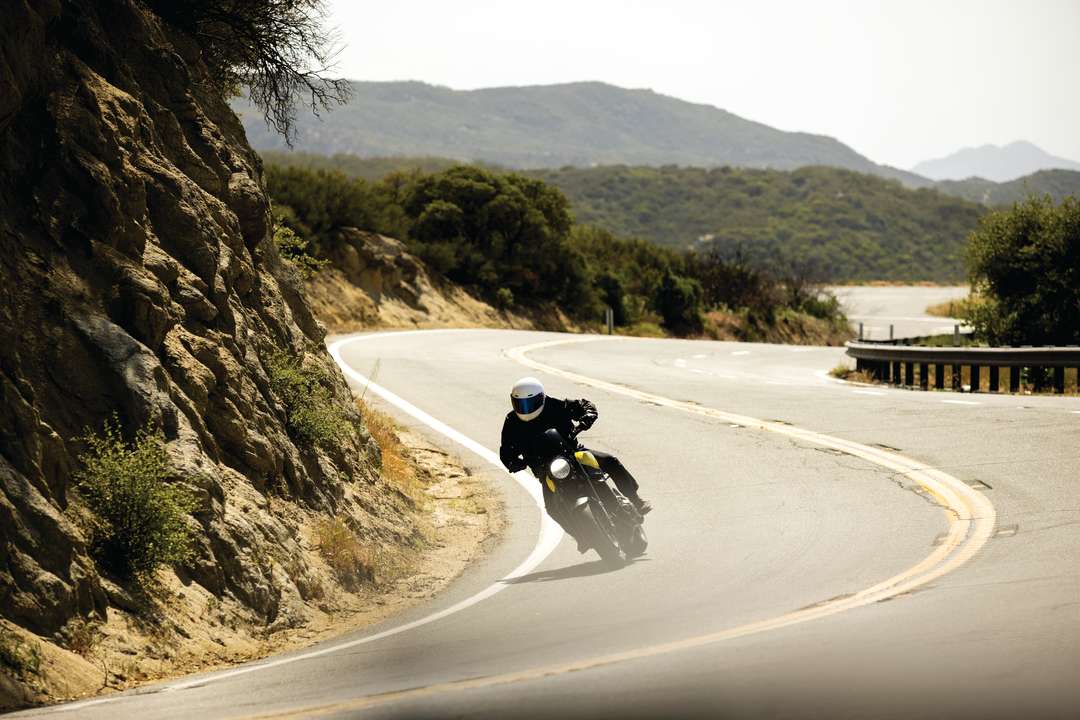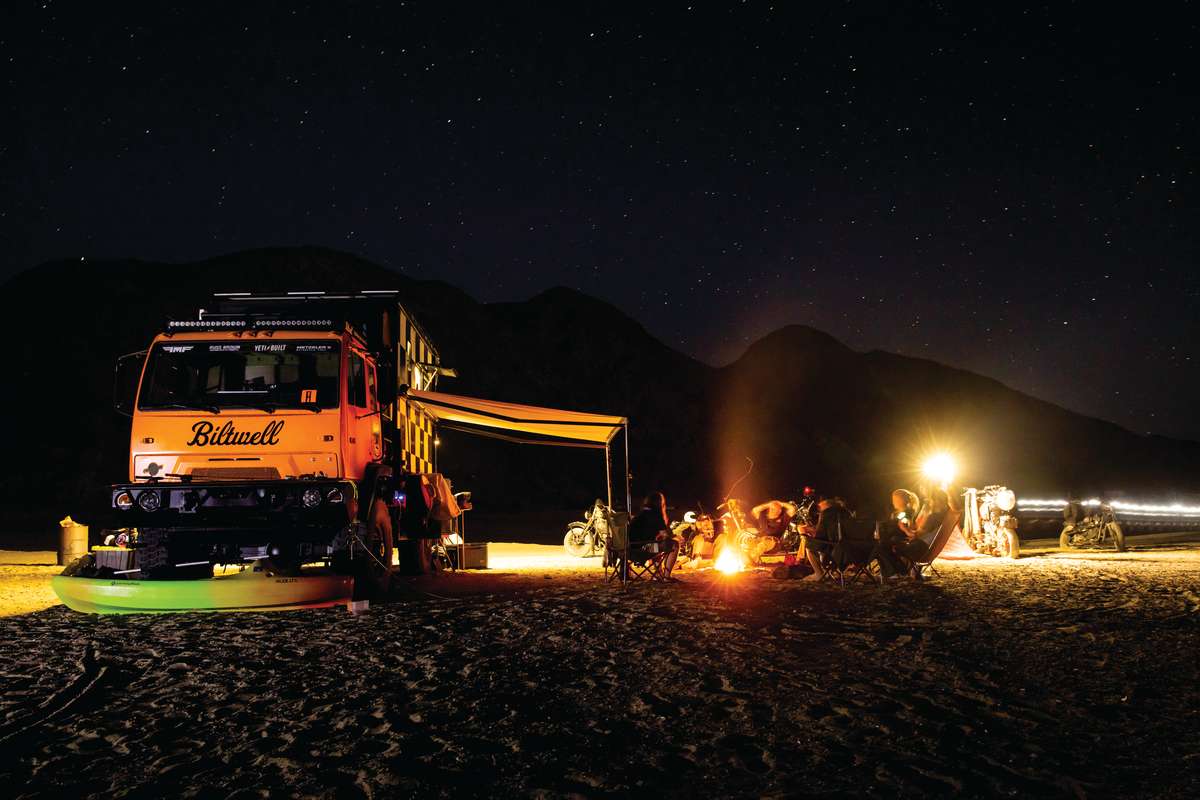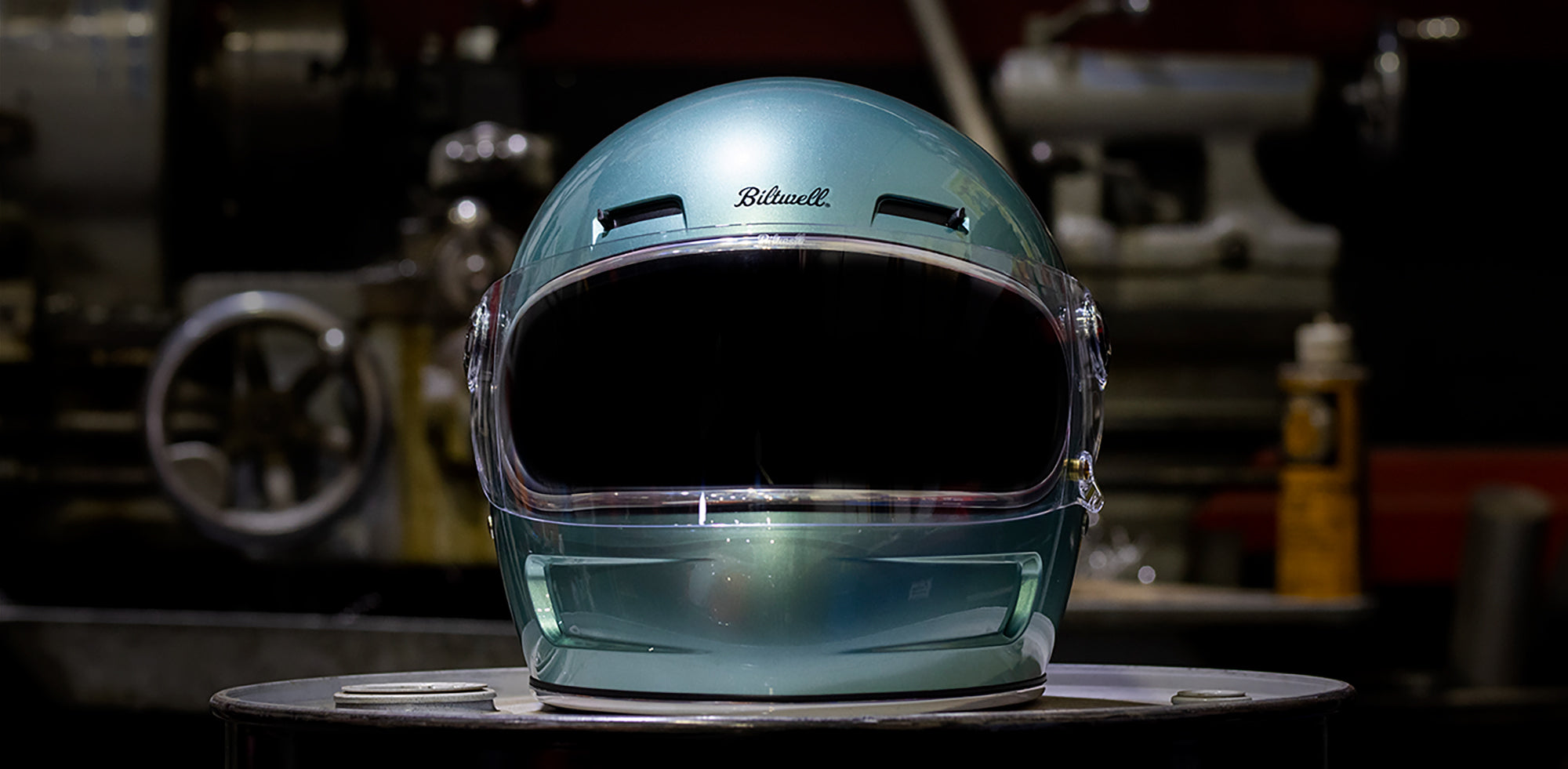
In the weeks leading up to their assault on the NORRA 1000 in 2018, Team Biltwell riders Bill Bryant and Erik Westergaard were at a swap meet with their Frijole XL883 on display. Commentary from the peanut gallery is standard fare at these soirees, but the frothy stream of verbal diarrhea reaches FEMA levels of suffering when there’s a Harley desert sled under your EZ-Up. Bill’s patience for tire kickers and looky-loos was already razor-thin when a fit, grey-haired man approached the Biltwell booth.
“Who’s riding this thing?”
“We are,” Bill replied.
“Well, you gotta fuckin’ be patient. Guys are gonna be disintegrating all around you, and you’re gonna think you’re going backwards, but you’ll be OK if you take your time. There’s a water crossing outside Loreto—DON’T be a hero and try to wheelie that thing. Get off, look around, see where the guys ahead of you are going. Look for tracks on the other side—that’s a sign it’s shallow enough to cross without taking on water.”
“Yeah… thanks,” Bill nodded, visibly unimpressed with the old timer’s advice.
Sensing tension, the affable gent said good-bye and walked away.
“Who the hell was that guy?” Bill asked.
“Ricky Johnson,” Westy replied.
“The Ricky Johnson?”
“Yup.”

If you grew up on dirt bikes in the ‘80s as Westy did, Ricky Johnson is a household name. Everyone who doesn’t follow American motocross—or anyone who came to two wheels on pavement—can be forgiven for not recognizing the seven-time AMA National Champ. In his prime during the Golden Age of American motocross, The Bad Boy earned six of those #1 plates in a three-year span from ’86 to ’88, dominating fellow champions like Bob Hannah, David Bailey, Mark Barnett, Jeff Ward, Johnny O’Mara, and Micky Diamond in the process.
After eclipsing Bob Hannah’s all-time supercross win record in February of 1989 during a dominant five-race winning streak, the Honda factory pilot headed to Gainesville, FL, to start his outdoor season. A fluke altercation during practice saw Danny Storbeck’s front wheel auger into RJ’s elbow, driving the bones of his forearm into his hand with enough force to shatter his right wrist and several bones in his throttle hand. He would return to Gatorback the following season to win another outdoor national, but six doctors concurred Ricky Johnson’s motocross career was over. At the Daytona Supercross in 1991, RJ announced his retirement. He was 26 years old. How he got there—and what he did next—is why Ricky Johnson is legendary. This is his story.

EARLY DAYS
Like so many MX champions before and after him, Johnson got his start on minibikes. Local TT races at first, but by nine he was racing motocross. “I lost my first race,” Ricky recalls with a wry smile. When he was 12, RJ rode a 125 for the first time. Sensing his son’s potential but unable to reconcile the high cost of maintaining two bikes, Mr. Johnson asked his son to make a choice. “I picked the 125. I went from 125 beginner to pro in three months.”
“How does that happen?” I asked incredulously.
“I was riding buddies with Broc Glover, who just signed with Yamaha. We were at a local spot in El Cajon and Broc let me ride his practice bike. I asked Broc if I could race it and he said yes, but that I couldn’t tell ANYONE. We went to Carlsbad and I signed up in 125 junior class. I’m 12 years old, standing on the milk crate on the starting line, the whole bit. I finished mid-pack, but I had a blast. Unfortunately, the parents of a lot of kids wanted to fight my dad because I rode so aggressively. I did most of my practicing with grown men, so when I bumped their kids in turns, it wasn’t pretty. When you grow up leaning on 25-year-olds, the 12-year-olds go flying. When I turned pro it was even worse. On a good night at a local track, I could walk away with five hundred bucks. When you’re a 13-year-old kid taking away a grown man’s food money, he will fuck you up.”
“I did most of my practicing with grown men, so when I bumped their kids in turns, it wasn’t pretty.”
Because sixteen is the minimum age limit in AMA pro racing, Ricky spent four years racing local pro events at non-AMA-sanctioned tracks throughout California, sometimes three classes per track and three tracks per week. “At one of my last amateur races Broc got me a test on Yamaha’s brand-new YZ100, their big-wheeled mini. I destroyed everyone on that thing. I won my second junior race, then like three in a row, so they moved me to intermediate. Now I’m a 12-year-old kid on a YZ100 racing 125 intermediates, but people protested me because they said my bike was smaller and quicker than everyone else’s.” When he turned 16 in 1980, Ricky entered his first AMA pro race —the San Diego Supercross. Ricky didn’t make the main, but fondly remembers battling 3-time AMA champ Marty Smith and 5-time FIM World Champion Georges Jobe in the LCQ.
In 1981, 17-year-old RJ contested the entire AMA 125 national circuit with factory support from Yamaha. At the last race of the season, Ricky won the second moto at the legendary Carlsbad Raceway. Young Johnson’s heroics in front of his hometown crowd were enough to earn him seventh overall in the championship, and AMA 125 Rookie of The Year honors. The Bad Boy had arrived.
WHERE DO I SIGN?
According to Racer X magazine, no one epitomizes the American motocross superstar better than Ricky Johnson. RJ’s work ethic, racecraft, gift of gab, and surfer boy’s good looks made Ricky a quadruple threat, and every marketing and team manager’s dream. Regarding his own dreams in those days, Ricky’s vision is crystal clear: “I wanted to make a million dollars—everyone I raced wanted to make a million dollars. We were convinced with a million bucks in the bank we could live off the interest the rest of our lives.” Ricky learned quick that getting good sponsors to pay big money was easy when he was winning. “Bell, Oakley, Fox… I’d get on the cover of Cycle News and these guys were psyched. Kawasaki had been courting me all year in ‘86, so I was pissed when they signed my ex-teammate Ron Lechien at the last minute, and I let ‘em know it. (Kawasaki team manager) Roy Turner called me and I told him, ‘I know you signed Ronnie, and that was a mistake. I’m gonna kick your guy’s ass.’ Yamaha was ready to pay me 225 grand for the next year and I was gonna sign the contract on Wednesday. On Tuesday night, Roger DeCoster called to ask me if I’d be interested in riding for Honda. I told him yeah, but only if I could ride one first.” DeCoster obliged the reigning Supercross and 250 MX champ by meeting RJ at a practice track with recently fired Ron Lechien’s works Honda and a suspension engineer. “Tano re-valved the shock, I raised the handlebars two millimeters and adjusted the levers a couple mill and—bam!—five seconds a lap faster than my Yamaha.” Ricky was sold on Big Red. Now all he needed was a contract.
What Johnson accomplished during contract negotiations with DeCoster at Honda was a masterclass in creative financing, but came at a price. “The money was crazy. My parents were running Ricky Johnson Incorporated at the time, and they’d never seen anything like it. Good base salary, hundred-thousand-dollar bonuses for every championship, contingencies for every podium at nationals, supercross and GPs, you name it. Plus, every time I won a championship, my salary would go up 50k the following year. Same with Fox, Alpinestars and the rest of ‘em.” Like so many other small, profitable family-owned businesses, the monster that RJ’s racing career had become “created a rift between me and my dad until the day he died,” Ricky laments. “I’d call him after getting second at a national and he’d holler, ‘You know how much fuckin’ money you lost? This much from Bell, that much from the other guys…’ yeah, I know dad. Eventually I had to make a break from my parents on the business side….” Ricky’s voice trails off and his thoughts appear to wander.“…things got complicated.”

Golden Parachute Pants
Brand collaborations these days are common as Instagram influencers, but were unheard of when Ricky Johnson was racing at the front of the global motocross pack. When I floated the notion that he may have unwittingly given birth to the modern collab when he convinced his streetwear sponsor and racing gear supplier to combine forces, Ricky couldn’t name anyone who beat him to it. Like every other hustle in RJ’s career, this one offered lessons in business they don’t give you in MBA school.
In 1984 Ricky met Mark and Brian Simo at an AMA national in Florida. The Simo brothers were peddling baggy shorts called Life’s A Beach out of a U-Haul trailer for 20 bucks a pair. Ricky dug the guys’ style and talked them out of some shorts for himself and his teammate Broc Glover. Sensing an opportunity to pay back the brothers’ generosity, RJ asked his Team Yamaha manager if he could wear a pair of turquoise tiger print boardshorts over his racing gear. “Kenny told me if I won the first moto I could do whatever the hell I wanted.” After getting a lesson in guerilla marketing from Ricky Johnson that resulted in selling every stitch of inventory in one day, the Chicago natives moved to California and set up shop in Carlsbad. Things ignited quickly, with offshoots Too Hip—an RJ-driven mail-order business—and an edgier subsidiary called Bad Boy Club rising from the fire. Ricky’s public image personified the Bad Boy brand perfectly, which seemed rooted in good times, all the time. Everyone wanted a seat on the Bad Boy bandwagon, JT Racing—RJ’s new riding gear sponsor—included. After agreeing to a royalty for using Life’s A Beach textile designs on their race gear, JT cranked out collab pants and jerseys faster than RJ could win races. Of course, every cash cow runs out of milk sometime, and the JT/BBC collab was no exception. In its prime, however, JT sold Ricky Johnson signature gear like dildos at an all-women’s prison. That was a good thing for Ricky, because his retirement from pro motocross was just around the corner. When that day came, Ricky Johnson Incorporated had to find a
new hustle.
BAD MOTHER TRUCKER
After dominating motocross for the better part of a decade, parlaying that success into a day job would have been a slam dunk for 26-year-old Ricky Johnson. When I asked him if he ever considered that route in retirement, RJ answered without hesitation. “No. I got offers from all of them—Bell, Oakley… I couldn’t do it. I didn’t want to have some douchey kid give me attitude because I woulda smacked him and said, ‘Fuck you!’” Instead, Ricky played to his strengths and did what he’s always done: he hustled. At the Baja 1000, Johnson took wins on two wheels in three different classes. Those heroics caught the attention of prominent racecar builders who helped Ricky land Chevrolet sponsorship and seat time in late-model stockcar and Craftsman truck events in the ‘90s. By the turn of the century, Ricky added ASA Rookie of the Year honors to his resumé, no easy feat when you consider his teammate at Herzog Racing was another phenom from El Cajon: eventual 7-time NASCAR champion Jimmie Johnson (no relation). Another high point on four wheels occurred in 2010 when RJ dethroned defending champ and multi-time Baja winner Rob MacCachren to take the 2010 TORC Pro2WD
series championship.

EIGHT HUSTLES AND COUNTING
Before meeting Ricky at his son’s fab shop for this interview, I asked Bill if he had any questions for the helpful stranger who told him how to finish the NORRA 1000 in 2018. “Yeah—ask him what’s the secret for making a living in motorsports for 40 years—that’s something anyone who rides motorcycles would love to know.”
As was the case with every rapid-fire exchange during our nearly two-hour bench racing session, RJ’s response was clear, blunt, and from the heart. “Sometimes I think about guys from my era who are now rich as fuck… guys like George Holland, who owns one of the top-10 almond farms in the business, or Chuck Sun, who told me to get into Bitcoin… I didn’t… I’m stupid (laughing). If you asked me that a year ago, I might have said I regret not taking a job for the security, or that I should have paid more attention to the money. But here’s the thing about money: I’ve always figured out how to earn it—that’s how I roll. It’s what I do. I don’t pay bills, I don’t manage accounts, that’s my wife’s job… I don’t want to know about it. I’m better when somebody just gives me a hundred bucks and says, ‘here’s your money for the week.’ Some days I’ll go big and buy a steak, but I’m just as happy with two hamburgers and a water. I don’t care. Would I rather have a shit ton of money in my pocket? Fuck yeah. Would I change what I’ve done to get it? No way. I’m still racing trucks. I’m racing cars, getting paid for TV commercials. I have eight hustles, and all of them are fun. When I look at my life, I’m winning… I’ve won. I’m crushing it.”

 Odds & Ends
Odds & Ends Parts & Labor Expo
Parts & Labor Expo Biltwell 100
Biltwell 100 El Diablo Run
El Diablo Run People's Champ
People's Champ Helmet Auction
Helmet Auction Motofest
Motofest Kernville Kampout
Kernville Kampout WTF Blog
WTF Blog P&L Magazine
P&L Magazine P&L Podcast
P&L Podcast




